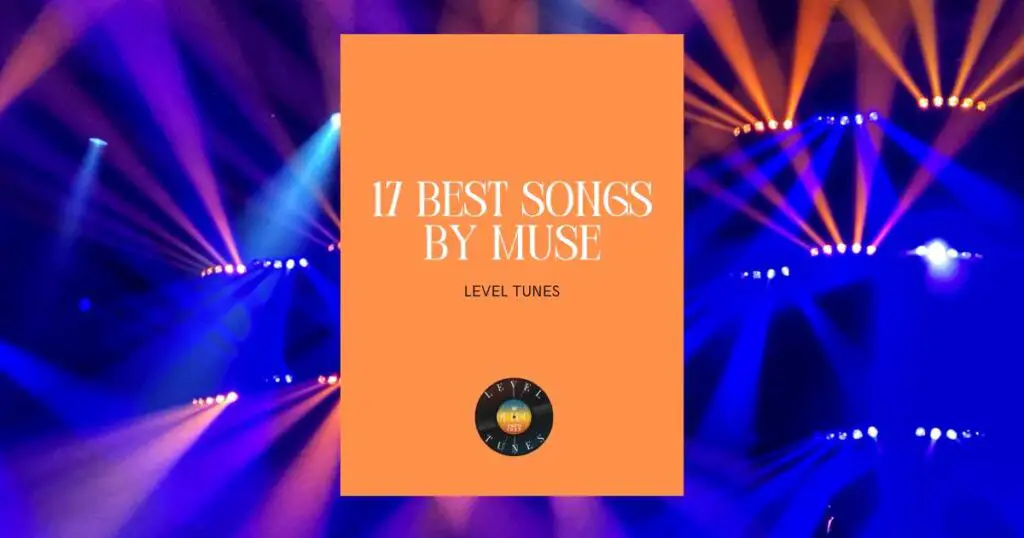17 Best Songs by Muse: You Need Now!
Hey there, fellow music aficionados and DJs! It’s your pal TBone here, from Level Tunes.
Today, I’m super excited to share something that’s been buzzing in my headphones for a while – a list of the 17 best songs by Muse.
Why Muse, you ask?
Well, these rock maestros have a knack for blending electrifying guitar riffs, mind-bending lyrics, and symphonic elements that just make your soul vibrate!
Whether you’re mixing tracks in the club or just looking for some epic tunes to rock your day, Muse’s songs are like a rollercoaster ride of sonic brilliance. From their early hits to the latest anthems, I’ve curated this list to showcase the diverse range of their musical genius. So, buckle up and let’s dive into the incredible world of Muse!
Here are the best Songs by Muse that you can check out:
List Of Best Songs by Muse
Best Songs by Muse in a list format:
1. Knights of Cydonia – Black Holes and Revelations (2006, Warner Bros. Records)
“Knights of Cydonia,” a tour de force of Muse’s unique sound, is a galloping space western epic. Released in 2006 as part of “Black Holes and Revelations,” this track showcases the band’s fearless experimentation. Matt Bellamy’s soaring vocals, combined with space-age guitar riffs and a hint of spaghetti western vibes, create a futuristic yet nostalgic atmosphere. It’s a song that makes you want to ride into battle against space invaders, all while questioning the very fabric of reality. Muse’s ability to blend genres and take listeners on a wild ride makes this track a standout and a fan favorite.
2. Uprising – The Resistance (2009, Warner Bros. Records)
From the opening beats of “Uprising,” you know you’re in for a rebellious ride. Featured on their 2009 album “The Resistance,” this song channels a powerful message against conformity and control. The driving bassline, courtesy of Chris Wolstenholme, and Dominic Howard’s relentless drumming, create a sense of urgency. Bellamy’s lyrics, infused with dystopian themes, resonate with anyone who’s ever wanted to challenge the status quo. It’s a protest song for the modern era, encapsulating Muse’s knack for combining political commentary with unforgettable melodies.
3. Starlight – Black Holes and Revelations (2006, Warner Bros. Records)
“Starlight,” a shimmering gem from “Black Holes and Revelations,” is a testament to Muse’s ability to craft songs that touch the heart. Released in 2006, it’s a love song set against the backdrop of the cosmos. Bellamy’s piano work intertwines beautifully with the rhythmic bass and drums, creating a sense of longing and hope. The chorus, with its catchy and uplifting melody, makes you feel like you’re reaching out to touch the stars. It’s a song about connection and the endless search for something beyond, making it a relatable and emotional journey.
4. Supermassive Black Hole – Black Holes and Revelations (2006, Warner Bros. Records)
“Supermassive Black Hole,” another standout from “Black Holes and Revelations,” broke new ground for Muse with its fusion of rock and electronica. The track’s gritty bassline, coupled with Bellamy’s falsetto and the funky, distorted guitar, creates a sound that’s both otherworldly and grounded. Released in 2006, it’s a song that feels like a dance with the unknown, embracing the chaos and beauty of a collapsing star. This track’s bold experimentation and infectious groove showcase Muse’s willingness to push boundaries and explore new sonic territories.
5. Hysteria – Absolution (2003, Warner Bros. Records)
“Hysteria,” from their 2003 album “Absolution,” is a whirlwind of raw emotion and technical prowess. The song’s intense bass intro, delivered masterfully by Wolstenholme, sets a frantic pace that’s mirrored in Bellamy’s urgent vocals and Howard’s explosive drumming. It’s a track that captures the essence of desperation and passion, with a driving melody that grips you from start to finish. The way Muse combines a sense of urgency with intricate musicianship in “Hysteria” makes it a standout track, perfectly encapsulating the band’s skill in crafting songs that are both emotionally charged and musically complex.
6. Madness – The 2nd Law (2012, Warner Bros. Records)
“Madness,” from Muse’s 2012 album “The 2nd Law,” is a departure from their typical rock roots, venturing into a more electronic and pop-oriented sound. The song’s minimalist approach, featuring a simple yet haunting melody, highlights Bellamy’s expressive vocals. The gradual build-up, culminating in a powerful guitar solo, illustrates the theme of sanity slipping away. It’s a song that explores the fine line between madness and love, showcasing Muse’s ability to evolve their sound while maintaining their emotional depth and lyrical prowess.
7. Plug In Baby – Origin of Symmetry (2001, Mushroom Records)
“Plug In Baby,” a track from their 2001 album “Origin of Symmetry,” is a frenetic showcase of Bellamy’s guitar virtuosity. The iconic riff that opens the song is instantly recognizable, setting the stage for a high-energy, futuristic rebellion against the constraints of technology. Bellamy’s vocals, ranging from whispers to screams, convey a sense of liberation and defiance.
8. Time Is Running Out – Absolution (2003, Warner Bros. Records)
“Time Is Running Out,” from their critically acclaimed album “Absolution” in 2003, is a masterclass in building tension and release. The song starts with a pulsating bassline that creates an atmosphere of urgency and anticipation. Bellamy’s vocals, ranging from seductive whispers to powerful outbursts, encapsulate the feeling of a race against time. The chorus explodes with a sense of desperation, perfectly capturing the theme of impending doom and the struggle to break free from constraints. It’s a song that not only resonates with the anxiety of the era but also showcases Muse’s ability to blend rock with elements of pop and electronic music.
9. Feeling Good – Origin of Symmetry (2001, Mushroom Records)
“Feeling Good,” a standout track from “Origin of Symmetry,” is Muse’s unique take on the classic song made famous by Nina Simone. Released in 2001, Muse transforms this standard into a dark, orchestral rock anthem. Bellamy’s powerful vocals, combined with dramatic piano and a robust rhythm section, give this song a new edge. It’s a testament to the band’s ability to take something familiar and make it distinctly their own, injecting it with a fresh, modern twist while respecting the original’s soul.
10. Stockholm Syndrome – Absolution (2003, Warner Bros. Records)
“Stockholm Syndrome,” another gem from “Absolution,” is a hard-hitting track that delves into the complexities of human relationships. The song’s heavy guitar riffs and pounding drums create a sense of intensity and chaos. Bellamy’s lyrics, exploring the psychological phenomenon of Stockholm Syndrome, are delivered with raw emotion, making the listener feel every ounce of the conflicted feelings at play. This track is a perfect example of Muse’s ability to combine thought-provoking lyrics with compelling music, creating a powerful and unforgettable listening experience.
11. Map of the Problematique – Black Holes and Revelations (2006, Warner Bros. Records)
“Map of the Problematique,” from “Black Holes and Revelations,” is a song that captures the angst and uncertainty of the modern world. The track, with its driving electronic beats and haunting lyrics, conveys a sense of dystopian despair. Bellamy’s voice, echoing with a sense of longing and desperation, perfectly complements the song’s atmospheric soundscape. Released in 2006, this song is a reflection on the complexities and challenges of contemporary life, showcasing Muse’s ability to craft songs that are not only musically innovative but also lyrically profound.
12. Resistance – The Resistance (2009, Warner Bros. Records)
“Resistance,” the title track from their 2009 album, is an anthem of defiance and love in the face of adversity. The song’s blend of piano-driven melodies and robust rock instrumentation creates a stirring and uplifting sound. Bellamy’s lyrics, inspired by themes of Orwellian surveillance and rebellion, resonate with a timeless message of standing up for what’s right. It’s a song that captures the essence of Muse’s thematic ambitions, combining grand musical landscapes with deeply personal and political elements.
13. Undisclosed Desires – The Resistance (2009, Warner Bros. Records)
“Undisclosed Desires,” another track from “The Resistance,” shows a different side of Muse. This song, with its more electronic and rhythmically driven sound, showcases the band’s versatility. The use of synthesized beats and strings, along with Bellamy’s softer vocal style, creates a more intimate and seductive atmosphere. Released in 2009, it’s a track that explores the innermost desires and vulnerabilities of the human heart, highlighting Muse’s ability to venture beyond their rock origins and experiment with different musical styles.
14. New Born – Origin of Symmetry (2001, Mushroom Records)
“New Born,” from “Origin of Symmetry,” is a song that masterfully blends soft piano melodies with explosive rock elements. The track begins with a haunting piano intro, which quickly escalates into heavy guitar riffs and dynamic drumming. Bellamy’s lyrics, exploring themes of technology and its impact on humanity, are delivered with a sense of urgency and power. Released in 2001, “New Born” is a perfect example of Muse’s skill in creating songs that are both musically complex and thematically rich.
15. Butterflies and Hurricanes – Absolution (2003, Warner Bros. Records)
“Butterflies and Hurricanes,” featured on “Absolution,” is a song that inspires and empowers. Its title, referencing the chaos theory concept, reflects the song’s message about the impact of small actions. The track features a blend of classical piano, rock instrumentation, and electronic elements, creating a sweeping and cinematic sound. Bellamy’s encouraging lyrics, urging listeners to be their best in times of hardship, are uplifted by the song’s dynamic and progressive structure. Released in 2003, it’s a track that not only showcases Muse’s musical versatility but also their ability to inspire and uplift through their music.
16. Survival – The 2nd Law (2012, Warner Bros. Records)
“Survival,” from their 2012 album “The 2nd Law,” is a song with an epic scale, fitting for its selection as the official song of the 2012 London Olympics. The track starts with dramatic piano chords and builds into a powerful rock anthem with orchestral backing. Bellamy’s vocals, full of determination and resilience, echo the song’s theme of overcoming challenges and striving for victory. “Survival” is a testament to Muse’s ability to create grand, theatrical music that resonates on a global stage, blending their signature rock sound with symphonic elements.
17. Psycho – Drones (2015, Warner Bros. Records)
Finally, “Psycho” from their 2015 album “Drones,” is a raw and unfiltered expression of the band’s heavier rock side. The song’s aggressive guitar riff and militaristic drumming create a confrontational and intense sound. Bellamy’s lyrics, critiquing the manipulation and control within military systems, are delivered with a visceral edge. “Psycho” stands out for its directness and simplicity, a departure from Muse’s more complex compositions, yet it retains the band’s signature style of blending thought-provoking themes with powerful music.
Fun Facts: Best Songs by Muse
1. Knights of Cydonia
- Fact: The music video for “Knights of Cydonia,” directed by Joseph Kahn, is a homage to 1970s science fiction and Spaghetti Western films. It features a mix of futuristic elements and classic Western motifs, creating a unique and memorable visual experience that perfectly complements the song’s eclectic style.
2. Uprising
- Fact: “Uprising” was used extensively in popular culture, including being featured as the opening theme for the BBC’s coverage of the 2012 Olympic Games. Its universal theme of resistance and empowerment made it a fitting anthem for such a significant global event.
3. Starlight
- Fact: Matt Bellamy has stated that “Starlight” was written as a straightforward love song, a contrast to Muse’s usually more complex and thematic compositions. The song’s simpler structure and romantic lyrics have made it one of the band’s most accessible and beloved tracks.
4. Supermassive Black Hole
- Fact: “Supermassive Black Hole” marked a stylistic shift for Muse, incorporating elements of electronic and dance music. This experimentation was initially a risk, but the song became one of their biggest hits, showing their ability to successfully explore new musical territories.
5. Hysteria
- Fact: The bassline of “Hysteria” is often cited as one of the best in modern rock music. Chris Wolstenholme’s powerful and intricate bass playing sets the foundation for the entire song and has been a major influence on aspiring bassists worldwide.
6. Madness
- Fact: “Madness” was one of the first songs where Muse extensively used electronic music elements, inspired by bands like Queen and Depeche Mode. The song’s minimalistic approach and gradual build-up represent a significant departure from their earlier, more rock-oriented sound.
7. Plug In Baby
- Fact: The iconic guitar riff of “Plug In Baby” has been voted one of the best riffs of the 21st century in several polls. Matt Bellamy’s unique style and technical skill are on full display in this track, solidifying his status as one of the most innovative guitarists of his generation.
8. Time Is Running Out
- Fact: “Time Is Running Out” was Muse’s first top 10 hit in the UK, marking a turning point in their commercial success. The song’s blend of rock and pop elements helped broaden their appeal, leading to wider recognition and a growing international fan base.
9. Feeling Good
- Fact: “Feeling Good” is a cover of a song originally written for the 1964 musical “The Roar of the Greasepaint – The Smell of the Crowd.” Muse’s version is a radical departure from the original and has been praised for its originality and emotional depth.
10. Stockholm Syndrome
- Fact: “Stockholm Syndrome” is known for its intense live performances. The band often extends the song with improvised sections, making each live rendition a unique experience. The song’s energy and complexity make it a favorite among Muse’s live audiences.
11. Map of the Problematique
- Fact: The title “Map of the Problematique” is inspired by a book called “The Limits to Growth” and its discussion of sustainable global practices. The song reflects the band’s interest in environmental and societal issues, adding a layer of depth to their music.
12. Resistance
- Fact: The lyrical content of “Resistance” is heavily influenced by George Orwell’s novel “1984.” The themes of love and rebellion in the face of an oppressive regime in the song mirror the narrative of Orwell’s dystopian masterpiece.
13. Undisclosed Desires
- Fact: “Undisclosed Desires” showcases Muse’s ability to incorporate unconventional instruments for a rock band. The use of the keytar and synthesized strings in the song demonstrates the band’s willingness to experiment and push the boundaries of their genre.
14. New Born
- Fact: “New Born” is often interpreted as a commentary on the evolution of technology and its impact on humanity. The fusion of classical piano with heavy electric guitar in the song symbolizes the juxtaposition of the organic and the synthetic, a recurring theme in Muse’s work.
15. Butterflies and Hurricanes
- Fact: The title “Butterflies and Hurricanes” is a reference to the butterfly effect in chaos theory. The song’s message encourages listeners to make significant changes from small actions, embodying the concept in both its lyrics and its dynamic musical shifts.
And there you have it, music lovers! A journey through Muse’s most iconic tracks, each a masterpiece in its own right. From soul-stirring ballads to electrifying rock anthems, these songs showcase the genius of Muse, a band that continually pushes the boundaries of music. Rock on!
Thanks for reading.
TBone




